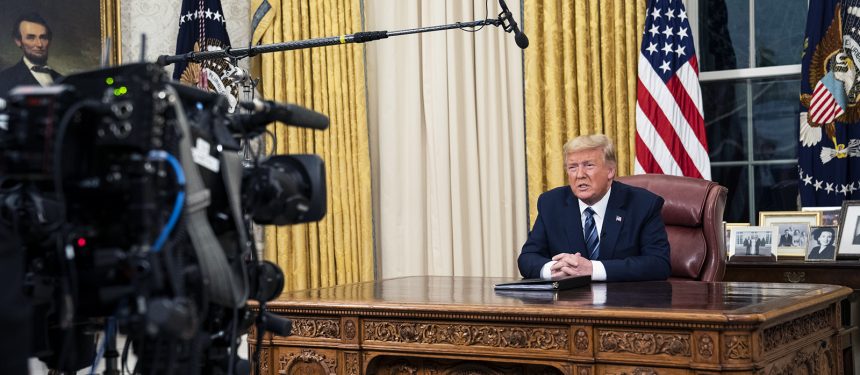US president Donald Trump’s announcement that travel for non-US nationals from 26 Schengen Area countries will be suspended for 30 days has been largely accepted by sector stakeholders in Europe as a means to contain the spread of the coronavirus. The suspension is due to come into effect at midnight EDT on March 13.
News and business analysis for Professionals in International Education
Have some pie!
“Safety first” say European educators as Trump announces travel ban
 Undetected coronavirus transmission threatens the security of US transportation, infrastructure and the nation, the president said. Photo: The White House
Undetected coronavirus transmission threatens the security of US transportation, infrastructure and the nation, the president said. Photo: The White House According to the US administration, as of March 9, the Schengen Area had “exported” 201 COVID-19 cases to 53 countries. Limiting the restrictions to the Schengen Area allows some notable exceptions across Europe, including the UK, Croatia, Cyprus, Ireland, Turkey, and Ukraine.
“The free flow of people between the Schengen Area countries makes the task of managing the spread of the virus difficult,” Trump said.
“We have to accept measures aimed at containing the pandemic”
The US government is “unable to effectively evaluate and monitor” all travellers arriving from the Schengen Area and undetected coronavirus transmission threatens the security of US transportation, infrastructure and the nation, the president added.
But despite the measures hindering international scientific cooperation, president of the German Academic Exchange Service (DAAD) Joybrato Mukherjee said that safety comes first.
“In this bleak situation, we have to be clear about one thing: We have to accept measures aimed at containing the pandemic, whether it be the closure of borders, a break in international air traffic or the cancellations of international conferences and meetings.” Mukherjee said.
“Nevertheless, we hope that closing the US border for students and scientists from Europe will only be a temporary measure.”
Mukherjee added that DAAD is contacting currently contacting German grant-holders who were looking to start their exchange semester in the US to “find flexible solutions for this challenge”.
In the Netherlands, Nuffic spokesperson Jeroen Wienen said the travel bans will affect student and research mobility to the US.
“It is difficult to determine what this decision will mean for future, long term student mobility,” he said.
“We see that conferences are cancelled or postponed, and in some cases organisers are doing their best to offer digital alternatives, reducing the need to travel and bring large groups of people together. Safety should come first.”
Wienen explained that Dutch immigration and naturalisation service is looking into situations where international students are experiencing problems with their right of residence due to travel bans.
EAIE president Sabine Pendl added that short term study will “clearly see an impact”.
US students in Europe have already been asked by their home institutions to return home, but in some cases, students had chosen to stay on the continent and “focus on their international experience by following local societal and health instructions”, Pendl continued.
“The EAIE is set to release a report in the coming days revealing the extent of the coronavirus impact and what institutions are concerned about moving forward.”
Sweden-based STS Education “should be okay”, its CEO John Cedergårdh said – as long as the ban is waived after 30 days.
It is “too early to fully determine the impact” of the US move, he added.
“So far though we have not seen the end of this virus outbreak. Naturally, we are worried about the impact on our future sales if the situation doesn’t improve.”
STS continues to focus on keeping its employees safe, Cedergårdh added, as well as ensuring customers are not taking a financial risk if they are booking with the company.
“Most customers seem to trust that this will be over in six months and we have not seen a large wave of cancellations,” he explained.
According to president & CEO of InterExchange Christine La Monica-Lunn said she expects cancellations and delays “as the full impact of this global situation unfolds”.
“For those who have not yet arrived to start programs, timing will be the biggest factor.
“For those on their programs, it’s about providing support should they fall ill or have their placements cut short,” she said, adding that InterExchange has made immediate contingency plans due to the suspension of entry for travellers from certain countries.
“We need to take this day-by-day…and most importantly, stay hopeful”
“We are bracing for similar reciprocal restrictions to be enacted for American travellers but for the time being we have halted all non-essential business travel and won’t be attending some of the conferences we had hoped to be at both in the US and abroad,” she said
“We need to take this day-by-day, keep the wellbeing of our participants, staff and hosts at the forefront of all business decisions, and most importantly, stay hopeful.”
Members of EnglishUSA have begun to petition members of the US house of representatives and the senate to remind them that “international education should not be forgotten about”, according to one stakeholder.
Acting secretary of United States Department of Homeland Security Chad F. Wolf said that the US move will “keep Americans safe and save American lives”.
Travel restrictions in January and February for individuals who had been in China and Iran had “proved to be effective in slowing the spread of the coronavirus to the US”, Wolf continued.
US passengers that have been in the Schengen Area will have to travel through select airports that have implemented enhanced screening procedures.
“While these new travel restrictions will be disruptive to some travellers, this decisive action is needed to protect the American public from further exposure to the potentially deadly coronavirus,” he said.
Still looking? Find by category:



Does Trump even care for the safety of its nationals, USA now ranks no1 in covid 19 cases, and he still does not have any clue how to deal with it.